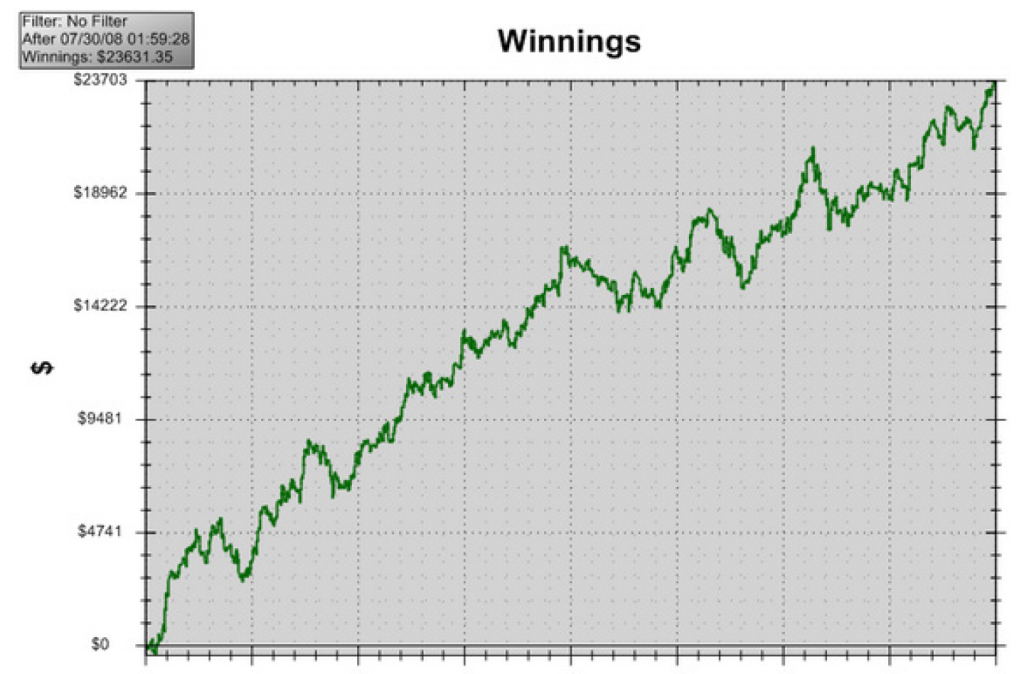I was 20 when I started playing poker. I didn’t even have a credit card, so I gave my college roommate $50 and he transferred it into a poker account for me. You obviously can’t wager very much with just $50, and I didn’t want to. I wanted to learn the game and try and win. So, I played the penny stakes. Winning or losing a couple dollars was a big swing, or at least it seemed it at the time.
I tracked my wins and losses every day in a notebook. I was supposed to be using it for taking notes in class but tracking poker pennies seemed like a much better use for it.
I remember the account got down to like $35 at one point as I was learning.
Slowly I got better and better. I got back up past my initial $50 deposit. Then I got to $100. Man! Was exciting.
I was reading anything I could get my hands on related to poker. I was talking poker with anyone who’d talk about it. I watched Rounders half a dozen times. I was hooked.
I couldn’t believe you could actually make money at this. $100 turned into $200.
$200 turned into $500.
Then $1,000.
“Is this real? Am I really going to be able to take this money out?”, I wondered.
Seemed unreal that you could profit from doing something so fun.
“Take it out man, you’re going to lose it!” I’d hear from people once they heard I was making money from it.
That’s the thought process for most people. Eliminate possibility of losses, instead of maximizing the possibility of winnings.
Luckily I didn’t listen. I kept learning the game, and kept playing.
Since I was still playing such low stakes, there wasn’t many swings. Obviously I’d still lose some games, but overall my graph went up pretty consistently.
I can remember thinking, “it’s so easy, why would I move up?”.
The easy money I was making down at the penny stakes was too good to be true. Why give that up and risk losing all my profits?
All the other penny players advised me to keep playing for pennies- “it’s so easy man!”
Well, being ever curious and inquisitive, I wanted to find out what higher level players thought. I didn’t know any at the time. I was a 20 year old kid at a tiny college learning to play in his dorm room.
I’d occasionally see a player online at higher stakes games sitting by himself with a lot of money. So, I sat down at his virtual table, and started a conversation with him.
I’m sure I asked a lot of intrusive, newbie questions like,
“Do you make a lot of money?”, but he was pretty open with me. He was around the same age I was, and supposedly making $1,000/week.
“$1,000/week!”. I was initially skeptical. I mean, I might have made around $1,000 or so off of my initial $50 deposit after a few months. But $1,000/week? Seemed too good to be true.
He gave me some advice for certain forums and books to read, and so I did.
“Woahhh.” It was like I found gold.
There was what at the time was a relatively small community of players. They were openly sharing stories about their adventures, and many were sharing about their wins and losses.
And they weren’t sharing them in an effort to sell coaching or some other ulterior motive, they were all just genuinely interested in exchanging ideas and figuring out the most optimal way to play.
It seemed like a number of people were making good money.
I found a few people who seemed like they were smart, and knew what they were talking about. Then I read as many posts as I could find from them.
(note: It’s the same strategy I used when I was beginning in business, and the same strategy I still use today when I want to quickly learn about a subject.
Find 1-3 people who seem like they really know what they’re talking about. Read EVERYTHING they say. Ignore EVERYONE else.)
There were plenty of people making money at the time, so even if someone was making money it didn’t mean they were any good. Sometimes it just meant they sucked less than the players who really had no idea what they were doing. That’s usually how growing, or hot markets work. It’s easy to confuse someone making money with someone who really knows what they’re doing.
After absorbing as much as I could, I moved out of the penny stakes and started playing higher.
Long story short, after a short learning curve I was making significantly more money playing at higher stakes. Over time I moved up again. Then again. Then again.
If I had stayed at the penny stakes so that I could protect my money and because it was “easiest”, I would have limited my results. It’s true that it would have been “easiest”, but in going with the easy route it would also mean I would not have reaped the rewards I did from poker.
(the only graph of mine we could find- 1 week of winnings while running hot)
Not only was I was able to make a very significant amount of money for someone in my early 20s, but the challenge of trying to beat the next level kept it interesting, and it was much more fulfilling than if I’d just played for pennies in an “easy game.”
If I’d stayed where it was easy, it would have lacked a challenge, been unfulfilling, and only made me a small amount of money.
I think my path to poker success was made easier because of the fact that I’m a logical thinker, so I only followed other logical people who could explain their thought process behind why they were doing what they were doing in a way that justified their reasoning. It kept me away from following people who may have had decent results, but didn’t actually think very optimally. Incorrectly following the ‘temporary earners’ who make temporary money only because of market conditions means you’ll be following suboptimal advice. It’ll be proven over time as their results fluctuate and often drop hard once the market corrects itself, and becomes more efficient.
Another reason I was able to steer clear of bad advice… there weren’t people selling all sorts of courses on how to extract more money from penny stakes games!
I wasn’t distracted at possibly doing better at the penny stakes. I followed the more optimal route of playing a different level of game entirely.
In the business world, and in life, most people don’t have these luxuries so there’s constantly barriers and distractions to getting to an optimal path.
There’s all sorts of illogical thinkers telling you to join them at the penny stakes of life.
Plenty of penny stakers in business want to make more money, so instead of going to the next level of the game, they teach others how to play the penny stakes. They want the “easy” road of the penny stakes, but they want the profits of the big stakes. So, they sell the penny stake dream.
People who might be the same hungry kid at the poker tables as I was looking for a good path to follow will be bombarded with advice.
“Start a blog!”
“Write a book!”
“It’s easy, click on my link!”
“Just buy this course, ‘blogging the penny stakes’!”
If you follow that illogical path you obviously won’t find a pile of money waiting for you, but the penny stakes salesman might.
If the salesman succeeds, then they’ll be a “success story”, and they’ll market that success even further as if it justifies the path they’re selling. If people thought about the logic, they’d realize the penny stakes dream they’re selling people isn’t even the same way they’re getting paid.
I remember the early days of poker. The community of players I mentioned who really knew what was going on with the games had a secret code. If you were at a table and someone seemed like they knew what they were doing, you’d ask a question with the secret code in it, and based on their response you’d know if they were in the ‘know’, and part of the ‘secret club’(I know it’s super dorky but whatever).
Well, in the current online business space, it seems like very few people are in the know. Everyone’s buying and selling ‘penny stakes dreams’, and no one seems the wiser for it. Behind closed doors there’s a small group of people ‘in the know’ who are frustrated at how many people are being bamboozled into going down a suboptimal path, but no ones saying anything about it.
Like in poker as the games progressed, many of the suboptimal thinkers teach, not because that is their calling, but because it’s more profitable for them to do so. Most of the optimal thinkers continue to actually play the game.
You must recognize what game you’re playing, and who’s profiting from that game. Like they say in poker, if you don’t know who the sucker is at the table… you’re the sucker.
It’s okay to play the penny stakes to learn the game, but at some point you’ve got to start playing the real game, or you’ll be stuck with penny stakes returns forever.
Don’t let the gurus convince you to play for pennies, as they collect dollars for telling you to play the wrong game.
“Thinking is the hardest work there is, which is probably the reason why so few engage in it.” – Henry Ford





